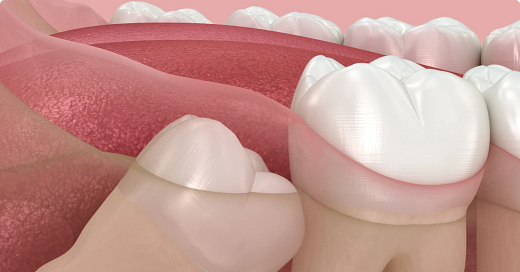Best Practices for a Smooth Wisdom Tooth Recovery
Wisdom tooth extraction is a common procedure to remove one or more third molars to prevent pain, crowding, or infection.
Best practices for a smooth wisdom tooth recovery involve taking the right steps to ensure proper healing after your extraction. Recovering from Wisdom Tooth Extraction requires time and care to minimize discomfort, reduce complications, and speed up the healing process. Understanding what to do—and what to avoid—can help you enjoy a faster and smoother recovery while preventing issues like infection, dry socket, and excessive swelling.
Immediate Post-Surgery Care:
The first 24-48 hours after your wisdom tooth removal are crucial for your recovery. During this time, your body begins to heal, but there are several things you can do to support the process and prevent complications.
Immediate care tips:
Rest: Avoid any strenuous physical activity. Resting helps your body focus on healing.
Apply gauze: Bite down gently on gauze pads to control bleeding. Replace them as necessary.
Avoid disturbing the extraction site: Don’t touch the area with your fingers or tongue.
Ice packs: Apply ice packs to your face to reduce swelling for the first 24 hours.
Take prescribed pain relievers: Follow your dentist’s instructions on when and how to take pain medications.
Following these instructions closely during the first few hours will help manage discomfort and reduce the risk of complications.
Managing Swelling and Pain:
Swelling is a normal part of recovery after wisdom tooth removal. It usually peaks around 48 hours post-surgery and then gradually begins to subside. You can take steps to manage swelling and discomfort, ensuring a smoother recovery.
Effective pain and swelling management:
Cold compress: Apply an ice pack to your cheek near the extraction site for the first 48 hours to reduce swelling.
Warm compress: After 48 hours, switch to warm compresses to help relax the muscles and improve circulation.
Pain medication: Use the pain relievers as prescribed by your dentist or oral surgeon to keep discomfort manageable.
Elevate your head: Sleeping with your head elevated can help reduce swelling and discomfort.
Properly managing swelling and pain will allow you to stay comfortable as you heal.
Soft Foods and Hydration:
Eating the right foods during your recovery is essential for healing. Hard, crunchy, or hot foods can irritate the extraction site and delay healing. A soft food diet will prevent unnecessary discomfort and avoid disturbing the surgical site.
Dietary tips for wisdom tooth recovery:
Soft foods: Stick to soft foods such as yogurt, mashed potatoes, smoothies, and soups that don’t require much chewing.
Avoid hot foods and drinks: Hot items can increase swelling or disturb the extraction site. Opt for lukewarm or cold foods.
Stay hydrated: Drink plenty of water to stay hydrated, but avoid using a straw, as suction can dislodge the blood clot.
No chewing near the extraction site: Avoid chewing directly on the area where the tooth was removed.
A soft food diet will help minimize discomfort and ensure you’re getting the nutrients needed for recovery.
Oral Hygiene and Care:
Keeping the surgical site clean is crucial to prevent infection and promote healing. However, it’s important to be gentle during the first few days to avoid disrupting the blood clot.
Oral hygiene tips after wisdom tooth removal:
Gentle brushing: Continue brushing your teeth, but avoid the extraction site for the first few days. Brush carefully around the healing area to avoid irritation.
Saltwater rinse: After the first 24 hours, rinse your mouth gently with warm saltwater to keep the site clean and reduce the risk of infection.
Avoid alcohol-based mouthwashes: These can irritate the healing tissues. Stick to gentle, non-alcoholic mouthwash or saltwater.
Don’t spit forcefully: Spitting can disturb the blood clot, increasing the risk of complications like dry socket.
Maintaining proper oral hygiene is essential for preventing infection and promoting healing.
Activity Restrictions and Rest:
After your Wisdom Tooth Extraction Treatment, it’s important to limit your physical activities to allow your body to heal without complications. Strenuous activity can increase blood pressure, which may cause bleeding or delay healing.
Activity restrictions include:
Avoid heavy lifting and exercise: Refrain from lifting heavy objects or engaging in intense physical activities for at least 3-4 days after surgery.
Limit talking and chewing: Give your mouth time to heal by speaking and chewing lightly, especially in the first few days.
Rest: Allow your body to focus on recovery by getting plenty of rest and avoiding unnecessary stress or exertion.
By limiting physical activity, you’ll reduce the risk of complications and ensure a smoother recovery process.
When to Seek Medical Attention?
While most wisdom tooth recoveries go smoothly, it’s important to recognize signs that may indicate a problem. If you experience any of the following symptoms, contact your dentist immediately.
Signs to watch for:
Excessive pain that doesn’t improve with medication or gets worse over time.
Severe swelling or bruising that worsens after the first 48 hours.
Signs of infection such as fever, pus, or a foul odor in your mouth.
Persistent bleeding that doesn’t stop after 24 hours or gets worse.
If you notice any of these symptoms, reach out to your dentist for prompt treatment and guidance.



